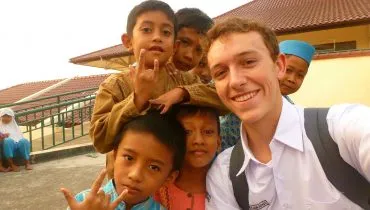A vast archipelago of more than 17,000 islands, Indonesia is a land of contrasts—fiery volcanoes and peaceful seas, crowded cities and distant plantations, modern high-rises and crumbling temples, Komodo dragons and countless tropical birds, young people on scooters wearing brightly-colored sarongs and batik shirts. More than 300 ethnic groups and cultures, with dozens of languages, different social and cultural backgrounds with European, Middle Eastern, and Asian influences make up the unique society of Indonesia.
Teens in Indonesia enjoy socialize in big groups. Sports are popular in Indonesia, especially soccer, badminton and pencak silat (a traditional form of martial arts). Want to build and fly kites? This is the place to do it!

 Questo sito fa uso di cookies – alcuni dei quali provenienti da terzi – al fine di migliorare la navigazione per i nostri utenti. Vedi la nostra
Questo sito fa uso di cookies – alcuni dei quali provenienti da terzi – al fine di migliorare la navigazione per i nostri utenti. Vedi la nostra